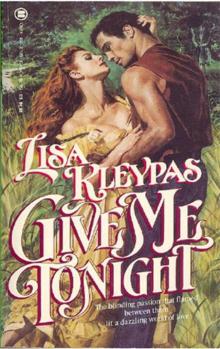- Home
- Lisa Kleypas
Love in the Afternoon Page 3
Love in the Afternoon Read online
Page 3
Beatrix and Audrey ascended the staircase, past rows of family portraits in heavy gold frames. Most of the subjects were Beauchamps, the aristocratic side of the family. One couldn’t help but notice that throughout the generations represented, the Beauchamps were an extraordinarily handsome people, with narrow noses and brilliant eyes and thick flowing hair.
As they reached the top of the stairs, a series of muffled coughs came from a room at the end of the hallway. Beatrix winced at the raw sound.
“Bea, would you mind waiting for a moment?” Audrey asked anxiously. “I must go to John—it’s time for his medicine.”
“Yes, of course.”
“Christopher’s room—the one he stays in when he visits—is right there. I put the letter on the dresser.”
“I’ll fetch it.”
Audrey went to her husband, while Beatrix cautiously entered Christopher’s room, first peering around the doorjamb.
The room was dim. Beatrix went to open one of the heavy curtains, letting daylight slide across the carpeted floor in a brilliant rectangle. The letter was on the dresser. Beatrix picked it up eagerly, her fingers itching to break the seal.
However, she admonished herself, it was addressed to Prudence.
With an impatient sigh, she slipped the unopened letter into the pocket of her walking dress. Lingering at the dresser, she surveyed the articles arranged neatly on a wooden tray.
A small silver-handled shaving brush . . . a folding-blade razor . . . an empty soap dish . . . a lidded porcelain box with a silver top. Unable to resist, Beatrix lifted the top and looked inside. She found three pairs of cuff links, two in silver, one in gold, a watch chain, and a brass button. Replacing the lid, Beatrix picked up the shaving brush and experimentally touched her cheek with it. The bristles were silky and soft. With the movement of the soft fibers, a pleasant scent was released from the brush. A spicy hint of shaving soap.
Holding the brush closer to her nose, Beatrix drew in the scent . . . masculine richness . . . cedar, lavender, bay leaves. She imagined Christopher spreading lather over his face, stretching his mouth to one side, all the masculine contortions she had seen her father and brother perform in the act of removing bristle from their faces.
“Beatrix?”
Guiltily she set aside the brush and went out into the hallway. “I found the letter,” she said. “I opened the curtains—I’ll pull them back together, and—”
“Oh, don’t worry about that, let the light in. I abhor dark rooms.” Audrey gave her a strained smile. “John took his medicine,” she said. “It makes him sleepy. While he rests, I’m going downstairs to talk with Cook. John thinks he might be able to eat some white pudding.”
They proceeded down the stairs together.
“Thank you for taking the letter to Prudence,” Audrey said.
“It’s very kind of you to facilitate a correspondence between them.”
“Oh, it’s no bother. It’s for Christopher’s sake that I agreed. I will admit to being surprised that Prudence took the time to write to Christopher.”
“Why do you say that?”
“I don’t think she gives a fig about him. I warned Christopher about her before he left, actually. But he was so taken with her looks and her high spirits that he managed to convince himself there was something genuine between them.”
“I thought you liked Prudence.”
“I do. Or at least . . . I’m trying to. Because of you.” Audrey smiled wryly at Beatrix’s expression. “I’ve resolved to be more like you, Bea.”
“Like me? Oh, I wouldn’t do that. Haven’t you noticed how odd I am?”
Audrey’s smile broadened into a grin, and for a moment she looked like the carefree young woman she had been before John’s illness. “You accept people for what they are. I think you regard them as you do your creatures—you’re patient, and you observe their habits and wants, and you don’t judge them.”
“I judged your brother-in-law severely,” Beatrix pointed out, feeling guilty.
“More people should be severe on Christopher,” Audrey said, her smile lingering. “It might improve his character.”
The unopened letter in Beatrix’s pocket was nothing less than a torment. She hurried back home, saddled a horse, and rode to Mercer House, an elaborately designed house with turrets, intricately turned porch posts, and stained-glass windows.
Having just arisen after attending a dance that lasted until three o’clock in the morning, Prudence received Beatrix in a velvet dressing gown trimmed with spills of white lace. “Oh, Bea, you should have gone to the dance last night! There were so many handsome young gentlemen there, including a cavalry detachment that is being sent to the Crimea in two days, and they looked so splendid in their uniforms—”
“I’ve just been to see Audrey,” Beatrix said breathlessly, entering the private upstairs parlor and closing the door. “Poor Mr. Phelan isn’t well, and—well, I’ll tell you about that in a minute, but—here’s a letter from Captain Phelan!”
Prudence smiled and took the letter. “Thank you, Bea. Now, about the officers I met last night . . . there was a dark-haired lieutenant who asked me to dance, and he—”
“Aren’t you going to open it?” Beatrix asked, watching in dismay as Prudence laid the letter on a side table.
Prudence gave her a quizzical smile. “My, you’re impatient today. You want me to open it this very moment?”
“Yes.” Beatrix promptly sat in a chair upholstered with flower-printed fabric.
“But I want to tell you about the lieutenant.”
“I don’t give a monkey about the lieutenant, I want to hear about Captain Phelan.”
Prudence gave a low chuckle. “I haven’t seen you this excited since you stole that fox that Lord Campdon imported from France last year.”
“I didn’t steal him, I rescued him. Importing a fox for a hunt . . . I call that very unsporting.” Beatrix gestured to the letter. “Open it!”
Prudence broke the seal, skimmed the letter, and shook her head in amused disbelief. “Now he’s writing about mules.” She rolled her eyes and gave Beatrix the letter.
Miss Prudence Mercer
Stony Cross
Hampshire, England
7 November 1854
Dear Prudence,
Regardless of the reports that describe the British soldier as unflinching, I assure you that when riflemen are under fire, we most certainly duck, bob, and run for cover. Per your advice, I have added a sidestep and a dodge to my repertoire, with excellent results. To my mind, the old fable has been disproved: there are times in life when one definitely wants to be the hare, not the tortoise.
We fought at the southern port of Balaklava on the twenty-fourth of October. Light Brigade was ordered to charge directly into a battery of Russian guns for no comprehensible reason. Five cavalry regiments were mowed down without support. Two hundred men and nearly four hundred horses lost in twenty minutes. More fighting on the fifth of November, at Inkerman.
We went to rescue soldiers stranded on the field before the Russians could reach them. Albert went out with me under a storm of shot and shell, and helped to identify the wounded so we could carry them out of range of the guns. My closest friend in the regiment was killed.
Please thank your friend Beatrix for her advice about Albert. His biting is less frequent, and he never goes for me, although he’s taken a few nips at visitors to the tent.
May and October, the best-smelling months? I’ll make a case for December: evergreen, frost, wood smoke, cinnamon. As for your favorite song . . . were you aware that “Over the Hills and Far Away” is the official music of the Rifle Brigade?
It seems nearly everyone here has fallen prey to some kind of illness except for me. I’ve had no symptoms of cholera nor any of the other diseases that have swept through both divisions. I feel I should at least feign some kind of digestive problem for the sake of decency.
Regarding the donkey feud: while I have sympathy for Caird and his ma
re of easy virtue, I feel compelled to point out that the birth of a mule is not at all a bad outcome. Mules are more surefooted than horses, generally healthier, and best of all, they have very expressive ears. And they’re not unduly stubborn, as long they’re managed well. If you wonder at my apparent fondness for mules, I should probably explain that as a boy, I had a pet mule named Hector, after the mule mentioned in the Iliad.
I wouldn’t presume to ask you to wait for me, Pru, but I will ask that you write to me again. I’ve read your last letter more times than I can count. Somehow you’re more real to me now, two thousand miles away, than you ever were before.
Ever yours,
Christopher
P.S. Sketch of Albert included
As Beatrix read, she was alternately concerned, moved, and charmed out of her stockings. “Let me reply to him and sign your name,” she begged. “One more letter. Please, Pru. I’ll show it to you before I send it.”
Prudence burst out laughing. “Honestly, this is the silliest thing I’ve ever . . . Oh, very well, write to him again if it amuses you.”
For the next half hour Beatrix took part in a meaningless conversation about the dance, the guests who had attended, and the latest gossip from London. She slipped the letter from Christopher Phelan into her pocket . . . and froze as she felt an unfamiliar object. A metallic handle . . . and the silk bristle of a shaving brush. Blanching, she realized that she had unintentionally taken the shaving brush from Christopher’s dresser.
Her problem was back.
Somehow Beatrix managed to keep smiling and chatting calmly with Prudence, while inside she was filled with turmoil.
Every now and then when Beatrix was nervous or worried, she pocketed some small object from a shop or residence. She had done it ever since her parents had died. Sometimes she wasn’t at all aware she had taken something, whereas at other times the compulsion was so irresistible that she began to perspire and tremble until she finally gave in.
Stealing the objects was never any trouble at all. It was only returning them that presented difficulties. Beatrix and her family had always managed to restore the objects to their proper places. But it had, on occasion, required extreme measures—paying calls at improper times of the day, or inventing wild excuses to roam through someone’s house—that had only fortified the Hathaways’ reputation for eccentricity.
Thankfully, it wouldn’t be that difficult to put back the shaving brush. She could do it the next time she visited Audrey.
“I suppose I ought to dress now,” Prudence finally said.
Beatrix took the cue without hesitation. “Certainly. It’s time for me to go home and attend to some chores.” She smiled and added lightly, “Including writing another letter.”
“Don’t put anything peculiar in it,” Prudence said. “I have a reputation, you know.”
Chapter Three
Captain Christopher Phelan
1st Battalian Rifle Brigade
Home Ridge Camp
Inkerman, Crimea
3 December 1854
Dear Christopher,
This morning I read that more than two thousand of our men were killed in a recent battle. One Rifle officer was said to have been bayoneted. It wasn’t you, was it? Are you injured? I’m so afraid for you. And I’m so sorry that your friend was killed.
We are decorating for the holidays, hanging holly and mistletoe. I am enclosing a Christmas card done by a local artist. Note the tassel and string at the bottom—when you pull it, the merrymaking gentlemen on the left will quaff their goblets of wine. (“Quaff” is such an odd word, isn’t it?—but it’s one of my favorites.)
I love the old familiar carols. I love the sameness of every Christmas. I love eating the plum pudding even though I don’t really like plum pudding. There is comfort in ritual, isn’t there?
Albert looks like a lovely dog, perhaps not outwardly a gentleman, but inside a loyal and soulful fellow.
I worry that something’s happened to you. I hope you are safe. I light a candle for you on the tree every night.
Answer me as soon as you’re able.
Sincerely,
Prudence
P.S. I share your affection for mules. Very unpretentious creatures who never boast of their ancestry. One wishes certain people would be a bit more mulish in that regard.
Miss Prudence Mercer
Stony Cross
Hampshire
1 February 1854
Dear Pru,
I’m afraid I was indeed the bayoneted one. How did you guess? It happened as we were climbing a hill to overtake a battery of Russian guns. It was a minor shoulder wound, certainly not worth reporting.
There was a storm on the fourteenth of November that wrecked the camps and sank French and British ships in the harbor. More loss of life, and unfortunately most of the winter supplies and equipment are gone. I believe this is what is known as “rough campaigning.” I’m hungry. Last night I dreamed of food. Ordinarily I dream of you, but last night I’m sorry to say that you were eclipsed by lamb with mint sauce.
It is bitterly cold. I am now sleeping with Albert. We’re a pair of surly bedfellows, but we’re both willing to endure it in the effort to keep from freezing to death. Albert has become indispensable to the company—he carries messages under fire and runs much faster than a man can. He’s also an excellent sentry and scout.
Here are a few things I’ve learned from Albert—
1. Any food is fair game until it is actually swallowed by someone else.
2. Take a nap whenever you can.
3. Don’t bark unless it’s important.
4. Chasing one’s tail is sometimes unavoidable.
I hope your Christmas was splendid. Thank you for the card—it reached me on the twenty-fourth of December, and it was passed all around my company, most of them never having seen a Christmas card before. Before it was finally handed back to me, the cardboard gentlemen attached to the tassel had done a great deal of quaffing.
I also like the word “quaff.” As a matter of fact, I’ve always liked unusual words. Here’s one for you: “soleate,” which refers to the shodding of a horse. Or “nidifice,” a nest. Has Mr. Caird’s mare given birth yet? Perhaps I’ll ask my brother to make an offer. One never knows when one might need a good mule.
Dear Christopher,
It feels far too prosaic to send a letter by post. I wish I could find a more interesting way . . . I would tie a little scroll to a bird’s leg, or send you a message in a bottle. However, in the interest of efficiency, I’ll have to make do with the Royal Mails.
I have just read in the Times that you have been involved in yet more heroics. Why must you take such risks? The ordinary duty of a soldier is dangerous enough. Have a care for your safety, Christopher—for my sake if not your own. My request is entirely selfish . . . I could not bear for your letters to stop coming.
I’m so far away, Pru. I’m standing outside my own life and looking in. Amid all this brutality, I have discovered the simple pleasures of petting a dog, reading a letter, and staring at the night sky. Tonight I almost thought I saw the ancient constellation named Argo . . . after the ship that Jason and his crew sailed in their quest to find the golden fleece. You’re not supposed to be able to see Argo unless you’re in Australia, but still, I was almost certain I had a glimpse of it.
I beg you to forget what I wrote before: I do want you to wait for me. Don’t marry anyone before I come home.
Wait for me.
Dear Christopher,
This is the perfume of March: rain, loam, feathers, mint. Every morning and afternoon I drink fresh mint tea sweetened with honey. I’ve done a great deal of walking lately. I seem to think better outdoors.
Last night was remarkably clear. I looked up at the sky to find the Argo. I’m terrible at constellations. I can never make out any of them except for Orion and his belt. But the longer I stared, the more the sky seemed like an ocean, and then I saw an entire fleet of ships mad
e of stars. A flotilla was anchored at the moon, while others were casting off. I imagined we were on one of those ships, sailing on moonlight.
In truth, I find the ocean unnerving. Too vast. I much prefer the forests around Stony Cross. They’re always fascinating, and full of commonplace miracles . . . spiderwebs glittering with rain, new trees growing from the trunks of fallen oaks. I wish you could see them with me. And together we would listen to the wind rushing through the leaves overhead, a lovely swooshy melody . . . tree music!
As I sit here writing to you, I have propped my stocking feet much too close to the hearth. I’ve actually singed my stockings on occasion, and once I had to stomp out my feet when they started smoking. Even after that, I still can’t seem to rid myself of the habit. There, now you could pick me out of a crowd blindfolded. Simply follow the scent of scorched stockings.

 Devil in Spring
Devil in Spring Sugar Daddy
Sugar Daddy Devil in Winter
Devil in Winter Dreaming of You
Dreaming of You Christmas Eve at Friday Harbor
Christmas Eve at Friday Harbor Love, Come to Me
Love, Come to Me Only With Your Love
Only With Your Love Suddenly You
Suddenly You Secrets of a Summer Night
Secrets of a Summer Night Cold-Hearted Rake
Cold-Hearted Rake Where's My Hero?
Where's My Hero? Gifts of Love
Gifts of Love Married by Morning
Married by Morning Then Came You
Then Came You Wish List
Wish List Where Dreams Begin
Where Dreams Begin A Historical Christmas Present
A Historical Christmas Present Somewhere I'll Find You
Somewhere I'll Find You Scandal in Spring
Scandal in Spring Someone to Watch Over Me
Someone to Watch Over Me Worth Any Price
Worth Any Price Prince of Dreams
Prince of Dreams It Happened One Autumn
It Happened One Autumn Love in the Afternoon
Love in the Afternoon Devil's Daughter
Devil's Daughter A Wallflower Christmas
A Wallflower Christmas Tempt Me at Twilight
Tempt Me at Twilight Brown-Eyed Girl
Brown-Eyed Girl Mine Till Midnight
Mine Till Midnight Again the Magic
Again the Magic Lady Sophia's Lover
Lady Sophia's Lover Because You're Mine
Because You're Mine Midnight Angel
Midnight Angel Smooth-Talking Stranger
Smooth-Talking Stranger Blue-Eyed Devil
Blue-Eyed Devil Hello Stranger
Hello Stranger Dream Lake
Dream Lake Devil's Daughter: The Ravenels Meet the Wallflowers
Devil's Daughter: The Ravenels Meet the Wallflowers A Christmas to Remember
A Christmas to Remember Smooth Talking Stranger
Smooth Talking Stranger Crystal Cove
Crystal Cove Marrying Winterborne
Marrying Winterborne Stranger in My Arms
Stranger in My Arms Devil in Disguise
Devil in Disguise Worth Any Price bsr-3
Worth Any Price bsr-3 Give Me Tonight
Give Me Tonight Rainshadow Road fh-2
Rainshadow Road fh-2 Seduce Me At Sunrise
Seduce Me At Sunrise I Will
I Will Someone to Watch Over Me bsr-1
Someone to Watch Over Me bsr-1 Lady Sophias Lover bsr-2
Lady Sophias Lover bsr-2 A Hathaway Wedding
A Hathaway Wedding A Hathaway Wedding (Hathaways Bk2.5)
A Hathaway Wedding (Hathaways Bk2.5) Worth Any Price - Bow Street 3
Worth Any Price - Bow Street 3 Christmas with Holly
Christmas with Holly